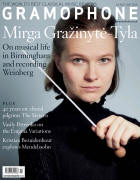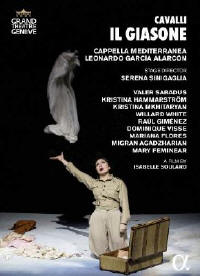Texte paru dans: / Appeared in: |
|
|
Outil de traduction (Très approximatif) |
|
|
Reviewer:
Alexandra Coghlan There’s something riotous about Il Giasone. Cavalli’s 1649 opera – the most-performed of the 17th century – positively delights in collisions, clashes and confrontations, whether of lofty Classical mythology and low sexual comedy, tragedy and farce or simple beauty and grotesque exaggeration. It’s a postmodern opera avant la lettre, gleefully poking fun at conventions and expectations while manipulating its audience with the very same. No wonder directors go mad for it. Mariame Clément’s 2010 production for Flemish Opera (Dynamic, 8/12) gathered inspiration by the loaded armful, flinging everything ancient and modern at the canvas. There’s something of that, too, about Serena Sinigaglia’s 2017 production for Geneva. Jason (Valer Sabadus), the feckless lover caught between two women, is a linen-clad Edwardian Lothario, his tongue even smoother than his boyish cheeks. He drifts amorously into the various orbits of tattooed, modern-day muscle-boy Hercules (whose Argonauts come in matching camogear and wife-beaters), his abandoned wife Hypsipyle (Kristina Mkhitaryan), styled as a flapper with a bevy of drop-waisted ladies frothing around her, and gods in elaborate Classical get-up, feathered headdresses, gilded armour and all. Pick a period, any period. The effect is boisterous, exuberant and just a little too much. Leonardo García Alarcón conducts an account by his own Cappella Mediterranea that’s very much in the same spirit. Instrumental ritornellos (borrowed, presumably, from other Cavalli scores) come liberally spiced with tambourines and castanets – unapologetically gaudy gilding on a lithe, light-footed account that throws itself headlong between moods. It’s when all the dancing stops, though, that this account comes into its own. A top-notch cast really savour the score’s lyricism, balancing all the cross-dressing camp with something disarmingly heartfelt. Sabadus is well cast. Reports from Geneva suggest that his soft, bladeless voice struggled to carry in the house; but, with the balance tweaked for DVD, he’s the embodiment of vacillating, soft-focus sensuality, opening with a ‘Delizie contenti’ of dangerous sweetness. He’s caught between the sterner charms of Kristina Hammarström’s Medea (conjuring a ferocious ‘Dell’antro magico’, her mezzo suddenly as craggy as Ezio Toffolutti’s set) and Mkhitaryan’s Hypsipyle, who may be dressed in delicate pastels but whose delivery is much bolder, chilled right down to blanched stillness at the start of Act 2 before reverting to her habitually brighter, deeper tones. Dominique Visse is an irrepressible Delfa, taking ‘her’ pleasure wherever possible, and there are fine cameos from the veteran tenor Raúl Giménez as the cuckolded Egeo (cruelly styled as Peter Ustinov’s Poirot in Death on the Nile), Willard White’s Oreste and Migran Agadzhanyan as a nervily energetic Demo. A blissfully happy ending squares the circle of this ambiguous story, placing moral scruples firmly out of sight and tucking away any fraying psychological threads. Sinigaglia’s production is Cavalli at play, an unruly Babel of sensation. The DVD lacks any extras and a complete libretto, though a basic synopsis and essay are provided. |
|




